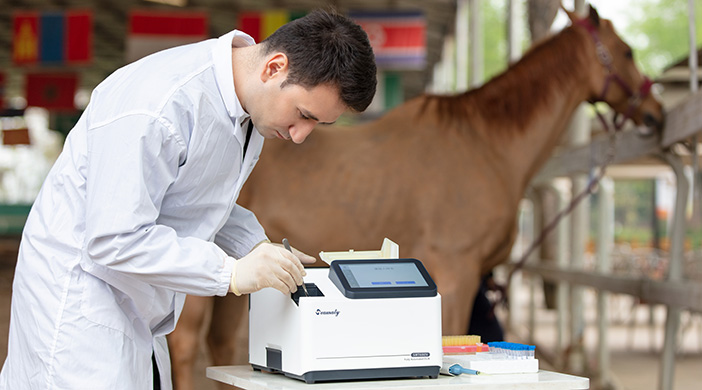
Biochemistry in animals
Biochemistry in animals, often referred to as veterinary biochemistry, involves the study of chemical processes and substances that occur within animals. Understanding biochemistry is essential for diagnosing and treating various diseases, understanding metabolic processes, and developing medical treatments. Here is an overview of key concepts in animal biochemistry:
Key Concepts in Animal Biochemistry
1. Molecular Biology of Cells
- Cell Structure: Understanding the basic structure and function of animal cells, including organelles like the nucleus, mitochondria, endoplasmic reticulum, and Golgi apparatus.
- DNA and RNA: Study of genetic material, gene expression, and the mechanisms of replication, transcription, and translation.
2. Proteins and Enzymes
- Amino Acids: The building blocks of proteins, their structure, and properties.
- Protein Structure: Primary, secondary, tertiary, and quaternary structures of proteins.
- Enzymes: Biological catalysts, enzyme kinetics, mechanisms of action, and regulation of enzyme activity.
3. Metabolism
- Carbohydrate Metabolism: Glycolysis, gluconeogenesis, the citric acid cycle, and oxidative phosphorylation.
- Lipid Metabolism: Fatty acid synthesis and oxidation, lipid transport, and storage.
- Protein Metabolism: Amino acid degradation, urea cycle, and protein synthesis.
4. Vitamins and Minerals
- Roles and Functions: Essential vitamins and minerals, their biochemical roles, and the effects of deficiencies.
- Cofactors and Coenzymes: Non-protein molecules that assist enzymes in catalysis.
5. Hormonal Regulation
- Endocrinology: Hormones and their biochemical pathways, including insulin, glucagon, thyroid hormones, and adrenal hormones.
- Signal Transduction: Mechanisms by which cells respond to hormonal signals.
6. Biochemical Pathways
- Integrated Metabolism: How different metabolic pathways interact and are regulated within the body.
- Homeostasis: Mechanisms that maintain internal balance in response to external changes.
7. Molecular Genetics
- Gene Regulation: Control of gene expression at the transcriptional and post-transcriptional levels.
- Mutations and Genetic Diseases: Types of mutations and their biochemical implications, inherited metabolic disorders.
Importance in Veterinary Medicine
1. Disease Diagnosis
- Biochemical Markers: Use of specific biochemical markers in blood, urine, or tissues to diagnose diseases (e.g., liver enzymes, glucose levels).
- Molecular Diagnostics: Techniques such as PCR and ELISA for identifying pathogens and genetic conditions.
2. Treatment and Management
- Pharmacology: Understanding the biochemical interactions of drugs within animal systems.
- Nutritional Biochemistry: Formulating diets based on the biochemical needs of different animal species and life stages.
3. Understanding Metabolic Diseases
- Diabetes Mellitus: Biochemical mechanisms of insulin deficiency or resistance, glucose metabolism.
- Hyperthyroidism/Hypothyroidism: Biochemical pathways affected by thyroid hormone imbalances.
- Metabolic Syndromes: Disorders such as ketosis in dairy cattle, hepatic lipidosis in cats.
Advanced Topics
1. Comparative Biochemistry
- Species Differences: Variations in metabolic pathways and biochemical processes among different animal species.
- Evolutionary Biochemistry: How biochemical pathways have evolved in different organisms.
2. Biotechnology and Genetic Engineering
- Recombinant DNA Technology: Producing hormones, vaccines, and therapeutic proteins.
- Gene Therapy: Potential for treating genetic disorders in animals.
3. Veterinary Toxicology
- Biochemical Mechanisms of Toxins: Understanding how toxins affect animal biochemistry and how to counteract them.
- Detoxification Pathways: Role of liver enzymes in metabolizing and excreting toxic substances.
Practical Applications
1. Clinical Biochemistry Tests
- Blood Chemistry Panels: Tests for liver function, kidney function, electrolyte balance, and more.
- Urinalysis: Chemical analysis of urine to diagnose diseases.
2. Nutritional Supplements
- Vitamins and Minerals: Supplementation based on biochemical needs.
- Nutraceuticals: Use of food-derived products with health benefits.
Conclusion
Biochemistry in animals is a fundamental aspect of veterinary medicine, providing crucial insights into the molecular and chemical basis of health and disease. A solid understanding of biochemistry enables veterinarians to diagnose diseases accurately, develop effective treatments, and improve animal nutrition and overall well-being.




